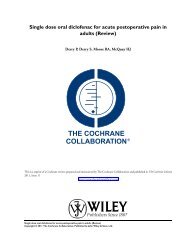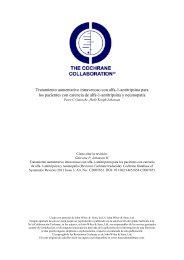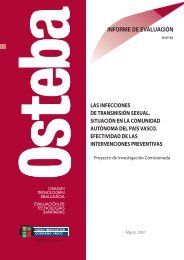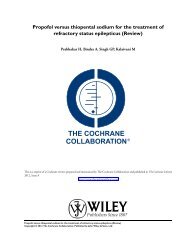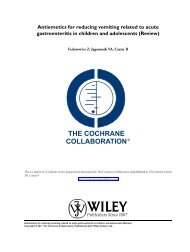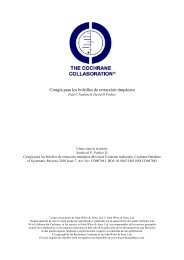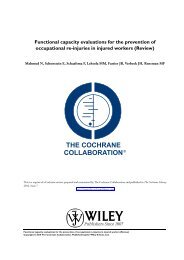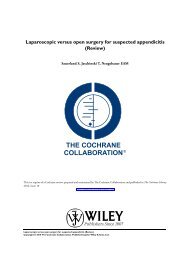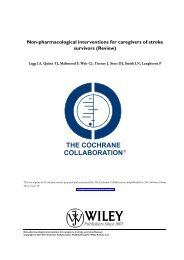Physical fitness training for stroke patients (Review) - Update Software
Physical fitness training for stroke patients (Review) - Update Software
Physical fitness training for stroke patients (Review) - Update Software
You also want an ePaper? Increase the reach of your titles
YUMPU automatically turns print PDFs into web optimized ePapers that Google loves.
Ryan<br />
Trial name or title Inflammation and exercise in <strong>stroke</strong><br />
Methods Randomised clinical trial; parallel assignment; open label<br />
Participants 150 participants expected<br />
Ischaemic or haemorrhagic <strong>stroke</strong> greater than or equal to 6 months prior with stable residual hemiparetic<br />
gait deficits<br />
Already completed all conventional inpatient and outpatient physical therapy<br />
Interventions Intervention: cardiorespiratory <strong>training</strong><br />
Control: stretching<br />
Outcomes Body composition, VO2 peak<br />
Starting date Start: May 2009<br />
Completion: April 2014<br />
Contact in<strong>for</strong>mation Dr Alice S. Ryan, University of Maryland, VA Research Service, USA<br />
Tel 410-605-7851, Email aryan@grecc.umaryland.edu<br />
Notes NCT00891514 (same as Ivey (A)?)<br />
Suskin 2007<br />
Trial name or title Cardiac rehabilitation <strong>for</strong> TIA <strong>patients</strong> (CR-TIA)<br />
Methods Randomised clinical trial, parallel assignment; single blind (outcomes assessor)<br />
Participants 200 participants<br />
Inclusion criteria: age > 20 years; documented TIA or mild non-disabling <strong>stroke</strong> within the previous 3 months;<br />
at least 1 of the following vascular risk factors: hypertension, ischaemic heart disease, diabetes mellitus,<br />
dyslipidaemia or cigarette smoking<br />
Exclusion criteria: inability to speak or understand English or provide in<strong>for</strong>med consent; severe aphasia that<br />
renders communication difficult or impossible; Modified Rankin Scale score of greater than or equal to 3;<br />
Mini Mental State Examination score ≤ 20; evidence of intracranial haemorrhage confirmed by CT scan<br />
or MRI study; anticipated or recent (< 30 days) carotid endarterectomy, angioplasty and/or stenting; resides<br />
> 1 hour travel time from London or Ottawa; prior participation in a CCR program; inability to per<strong>for</strong>m<br />
expected exercise <strong>training</strong> of CCR program; evidence of cardioembolic source <strong>for</strong> TIA/<strong>stroke</strong> such as atrial<br />
fibrillation, valvular disease, septal defect or left ventricular wall motion abnormality; participation in another<br />
clinical trial that could interfere with the intervention or outcomes of the current study<br />
Interventions Intervention: comprehensive CCR program plus usual care (include home-based exercise 2 days/week <strong>for</strong> 6<br />
months)<br />
Control: usual care alone<br />
Outcomes Primary outcome measures: functional capacity; lipid profile; depression symptoms; cognition<br />
Secondary outcome measures: cerebrovascular and cardiovascular events; physiological, anthropometric and<br />
behavioral vascular risk factors; neurocognitive measure; quality of life<br />
<strong>Physical</strong> <strong>fitness</strong> <strong>training</strong> <strong>for</strong> <strong>stroke</strong> <strong>patients</strong> (<strong>Review</strong>)<br />
Copyright © 2011 The Cochrane Collaboration. Published by John Wiley & Sons, Ltd.<br />
85



